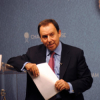Ron Suskind

Ron Suskind
Ronald Steven "Ron" Suskind is a Pulitzer Prize winning American journalist and best-selling author. He was the senior national affairs writer for The Wall Street Journal from 1993 to 2000 and has published the books A Hope in the Unseen, The Price of Loyalty, The One Percent Doctrine, The Way of the World, Confidence Men, and his memoir Life, Animated: A Story of Sidekicks, Heroes, and Autism. He won the 1995 Pulitzer Prize for Feature Writing for articles in the...
NationalityAmerican
ProfessionJournalist
Date of Birth20 November 1959
CountryUnited States of America
To try to be authentic these days, to ask questions of the people in power - it's difficult. This administration has evolved new techniques to handle people like me. Their strategy, in a word, is simple: ignore them.
The substance of faith is a hope in the unseen.
The fact is, most journalists I know are not particularly political. They move around a lot.
The informed, unmanaged question. That's the most dangerous thing at a press conference anywhere.
When you get people standing up saying, 'I'm going to just tell the truth; what do we have to fear?,' it encourages others, and it creates a counterresponse.
The fact is that in a way, journalists become a kind of default in the system when you don't have substantive two-party back-and-forth inside of the government.
Every person has their pantheon - the Bible, Hollywood, Shakespeare - their way of understanding the world.
If you write something that gets a bad response, or someone commits candor or is off message, there are often consequences almost immediately when it appears in the paper or a magazine, that somebody gets called into the boss's office. And sometimes it can result in a loss of access for the reporter.
By virtue of some of the ways the game is played, in terms of message discipline, in terms of access for reporters, and especially in the way that sources and subjects, especially famous subjects, treat the media, almost by default there's more news that's falling into books.
All of the leading terrorism experts are clear on one thing: that in terms of protecting America, we are almost never going to know a place or a time of an attack.
Wars tend to be very public things, they are visible. There are correspondents traveling with the troops and you get daily dispatches.
The media has become more forceful, has begun to recognize its traditional historic role and act on it, and truth is infectious.
Civilizations rise and fall on confidence. America had figured out a way to borrow money to manufacture it.
A little known area often defines the fortunes of leaders -- management skills.